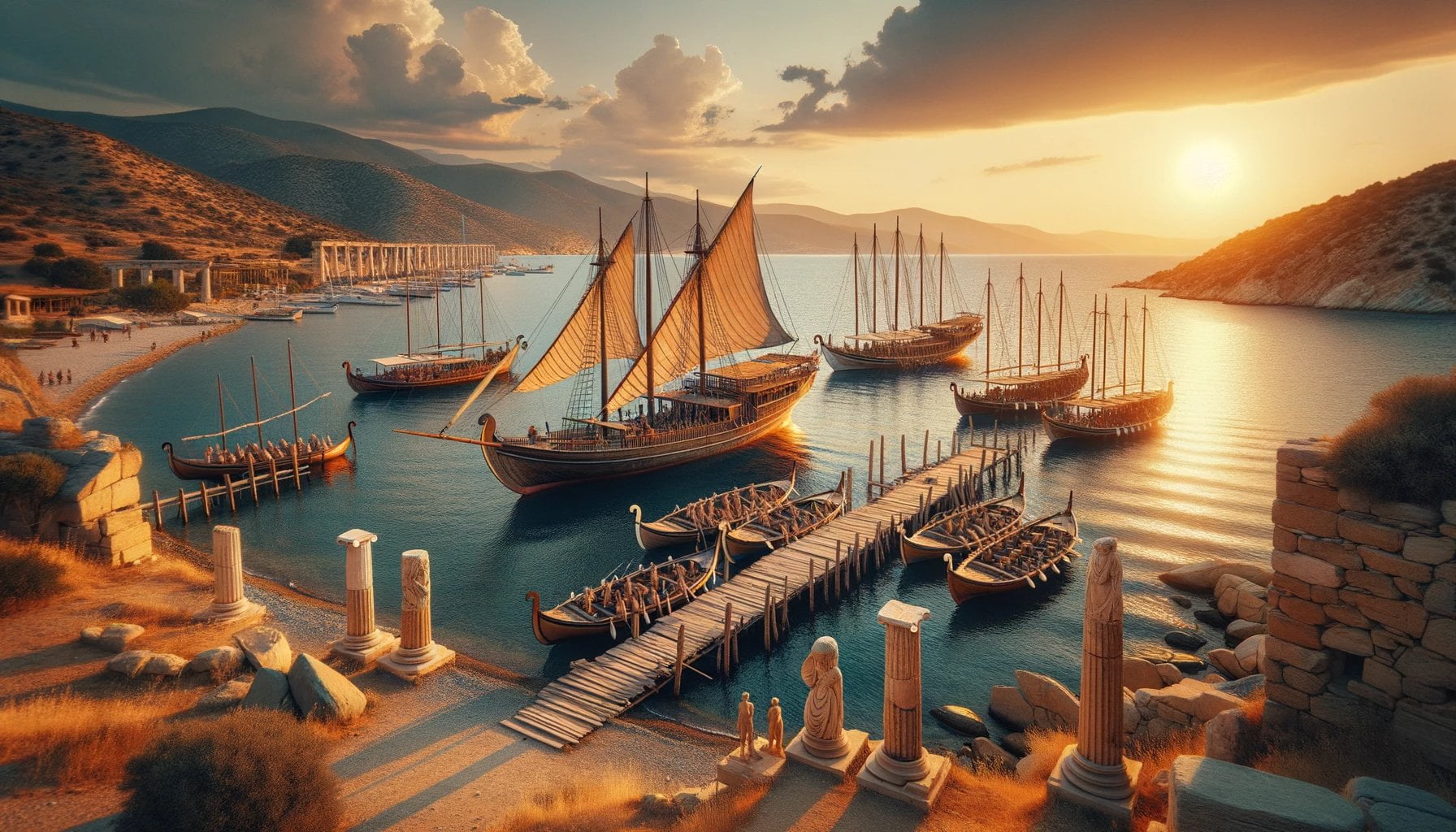Uncovering Ancient Greece’s Expansion into the Black Sea Region delves into the fascinating history of the interactions between Ancient Greece and the Black Sea. With a focus on the Greek colonies that flourished along the Black Sea coast, this article explores the significance of this region for Ancient Greece’s expansion, trade routes, and cultural exchanges. Shedding light on the forgotten aspects of this ancient civilization, this article utilizes extensive research and expert analysis to present an engaging narrative of Ancient Greece’s influence in the Black Sea region.

Key Takeaways:
- The Black Sea was colonized by the Ancient Greeks in the 8th-6th centuries BC.
- The colonization was mainly carried out by Ionians who aimed to exploit the region’s fishing and agricultural resources.
- Contrary to earlier migrations in the Greek Dark Ages, the colonization of the Black Sea was organized by city-states rather than tribes.
Ancient Greece’s Influence on the Black Sea Region
The ancient civilization of Greece, with its rich history and cultural contributions, extends far beyond the borders of its mainland. One significant area where the influence of Ancient Greece is often overlooked is the Black Sea region. In this article, we will delve into the fascinating expansion of Ancient Greece into the Black Sea and explore the various aspects of their interactions and impact on this region.
Colonization of the Black Sea
During the 8th to 6th centuries BC, the Black Sea became the focus of Ancient Greek colonization efforts. It was the last area to be colonized by the Greeks, and it was mainly the Ionians who led this exploration. Motivated by the abundant fishing and agricultural resources of the region, the Ionians sought to establish prosperous colonies along the Black Sea coast.
Unlike the migrations of the Greek Dark Ages, where tribes moved in search of new lands, the colonization of the Black Sea was organized by the originating city-states. This meant that the colonies were established and governed by the originating cities, maintaining a sense of connection and control.
Trade and Cultural Exchange
The colonization of the Black Sea by the Ancient Greeks opened up new avenues for trade and cultural exchange. The colonies became vital hubs for maritime commerce, fostering connections between the Greek world and other civilizations in the region. The Greeks established lucrative trade routes, exporting goods such as wine, olive oil, pottery, and textiles, while also importing valuable resources like grain, timber, and metals.
These trading networks not only facilitated economic growth but also facilitated the exchange of ideas, beliefs, and artistic influences. The colonies acted as melting pots of cultures, where Greek customs blended with those of the indigenous peoples and other neighboring civilizations. This cultural diffusion led to the emergence of unique artistic styles and the development of a vibrant multicultural society.
Geopolitical Significance
The colonization of the Black Sea by Ancient Greece also had significant geopolitical implications. The establishment of Greek colonies along the Black Sea coast served as a strategic move, expanding their influence in the region. These colonies acted as a buffer zone against potential threats and provided access to important resources and routes for further expansion.
Moreover, the Greek colonies played a crucial role in the spread of Greek language and culture. As these colonies developed and thrived, they became centers of learning and intellectual achievement. They contributed to the growth of knowledge, producing renowned scholars, philosophers, and poets who left a lasting impact on the broader Greek world.
Conclusion
In conclusion, the expansion of Ancient Greece into the Black Sea region was a significant chapter in their history. Through colonization, trade, and cultural exchange, the Greeks left an indelible mark on the region. Their colonies not only facilitated economic growth and cultural diffusion but also secured geopolitical advantages. By understanding and uncovering this aspect of Ancient Greece’s history, we gain a deeper appreciation for the complex and far-reaching nature of this remarkable civilization.
Sources:
Wikipedia. “Greek colonisation.” (URL: https://en.wikipedia.org/wiki/Greek_colonisation)
Laconia, Ancient Greece was a land known for its Spartan warriors and rich history. Learn more about this fascinating region by clicking here.
Discover the remarkable achievements of Ancient Greece and how they shaped our world today by clicking here.
Step into the ancient city of Rhodes and immerse yourself in the stories of its great civilization by clicking here.
Uncover the epic Battle of Salamis and its pivotal role in Ancient Greek history by clicking here.
Explore the powerful rulers who shaped Ancient Greece and left lasting legacies by clicking here.
Economic Importance and Trade Routes in the Black Sea Region
The Black Sea region has always played a significant role in the economic landscape, acting as a vital trade route connecting various civilizations. With its strategic location as a crossroads between Europe, Asia, and the Middle East, the Black Sea region has witnessed the exchange of goods, ideas, and cultures throughout history. In this article, we will explore the economic importance and trade routes that flourished in the ancient times, shedding light on the impact they had on the development of the region.
The Black Sea: A Hub of Commercial Prosperity
The Black Sea’s geographical position, surrounded by diverse landscapes and rich natural resources, made it a hub of commercial prosperity in ancient times. With its favorable climate and fertile land, the region facilitated the growth of agriculture, particularly the production of cereals, which became a significant export product for the Black Sea ports during the 19th century[^1^]. This abundance of resources, combined with the region’s role as a gateway between Europe and Asia, attracted traders and fostered a vibrant economic environment.
Political Stability and Long-Distance Trade
The stability of political regimes in the Black Sea hinterland played a crucial role in facilitating long-distance trade. Political stability ensured safe passage for merchants and allowed for the establishment of commercial relationships between different regions. By creating a conducive environment for trade, stability fueled the economic growth of the Black Sea ports and stimulated interregional exchanges.
Cultural Exchange and the Distribution of Goods
Trade in the Black Sea region fostered the exchange of goods and ideas, contributing to the cultural and artistic richness of the ancient world. The Black Sea’s extensive trade network supported the distribution of pottery and precious goods across diverse regions, facilitating cultural diffusion and interconnectedness[^2^]. This exchange not only enriched the material culture of the societies involved but also allowed for the dissemination of knowledge and beliefs.
Challenges and Disparities along Trade Routes
While trade routes in the Black Sea region offered numerous opportunities for economic prosperity, they also faced significant challenges. Political tensions and economic disparities among countries in the region often hindered smooth trade operations. However, despite these obstacles, the Black Sea’s ports continued to play a crucial role in the economic, social, cultural, and tourist relations with the rest of the world, preserving their significance as important nodes of trade and exchange.
Consolidating Economic and Geopolitical Influence
The ports along the Black Sea coast have historically contributed to consolidating economic and geopolitical influence in the region. The Black Sea’s position as a crossroads for Europe, Asia, and the Middle East has made it a crucial route for the movement of energy resources to Europe. As a result, global and regional powers, such as Russia, have vied for influence, leverage, and access to resources and ports in the Black Sea region. These ongoing power struggles continue to shape the economic dynamics of this historically significant region.
Key Takeaways:
- The Black Sea has historically functioned as a vital trade route, fostering commercial prosperity in the region.
- Political stability in the hinterland facilitated long-distance trade and interregional exchanges.
- Trade in the Black Sea facilitated the distribution of goods and cultural exchange across diverse regions.
- Challenges faced along trade routes include political tensions and economic disparities among countries in the region.
- Ports on the Black Sea coast have played a significant role in the economic and geopolitical relations between Europe, Asia, and the Middle East.
- The Black Sea continues to be a strategic route for the movement of energy resources, leading to competition among global and regional powers.
Sources:
– Lyratzopouoou, D., & Zarotiadis, G. (2014). Black Sea: Old Trade Routes and Current Perspectives. ScienceDirect. link
– Cartwright, M. (2018). Trade in Ancient Greece. World History Encyclopedia. link
Cultural Exchanges between Ancient Greeks and Indigenous Peoples of the Black Sea
The Black Sea region holds a treasure trove of history, particularly when it comes to the cultural exchanges between Ancient Greeks and the indigenous peoples of the area. These exchanges were characterized by a fascinating blend of traditions, ideas, and influences from both sides. Let’s delve into the rich tapestry of interactions that occurred in this captivating region.
The Meeting of Cultures
One of the intriguing aspects of the cultural exchanges between Ancient Greeks and the indigenous peoples of the Black Sea is the syncretic culture that emerged in the Prut-Dnestur region at the end of the first millennium BC. This syncretic culture drew heavily from the Thracian (Getic) traditions, showcasing the dynamic fusion of different cultural elements.
Furthermore, the early contacts between the Greek world and the Scythians and other peoples on the Black Sea are reflected in the myth of the Argonauts. This myth, which tells the story of Jason and his crew searching for the Golden Fleece, reveals the early ties between the Greeks and the indigenous peoples of the region.
Greek Colonization: Trade and Influence
Greek colonization played a pivotal role in facilitating cultural exchanges with indigenous peoples along the Black Sea coast. Establishing colonies during the 8th to 6th centuries BC, the ancient Greeks were driven by motivations such as trade and resource opportunities. These colonies became important hubs for maritime commerce, facilitating interactions between the Greek world and other civilizations in the region.
The establishment of Greek colonies brought economic growth and the exchange of ideas, beliefs, and artistic influences. It led to the emergence of unique artistic styles and vibrant multicultural societies. These colonies also played a crucial role in the spread of Greek language and culture. The revival of the Greek language in the region of Pontus is a testament to the lasting impact of these exchanges.
Different Paths to Colonization
Greek colonies in the Black Sea region were founded through various means, including war, diplomacy, and intermarriages with indigenous peoples. The earliest Greek settlements on the Black Sea are still the subject of ongoing debates among historians. As these colonies flourished, they maintained a sense of connection and control with their originating city-states, making them integral parts of the Greek world.
Dimensions of Cross-Cultural Interaction
The interaction between the Greeks and the indigenous peoples of the Black Sea region encompassed various dimensions. It included cultural, religious, and artistic exchanges, as well as exchanges in trade and governance systems. The diversity of these interactions added to the complexity and richness of ancient civilizations.
Key Takeaways:
- The syncretic culture in the Prut-Dnestur region showcased the blending of Thracian (Getic) traditions with Greek influences.
- The myth of the Argonauts reveals early contacts between the Greek world and indigenous peoples on the Black Sea.
- Greek colonization brought trade, economic growth, and the spread of Greek language and culture to the region.
- Greek colonies in the Black Sea region were founded through various means, including war, diplomacy, and intermarriages.
- Cross-cultural interactions included dimensions such as cultural, religious, and artistic exchanges, as well as trade and governance systems.
Citations:
– Munteanu, A. “Ethnic Contacts and Cultural Exchanges North and West of the …” Bryn Mawr Classical Review, 2006.
– Mirkovic, M. “Black Sea Cultures and Peoples, The Danubian Lands …” Maya Vassileva Academia.edu.
Legacy and Lasting Impact of Ancient Greece in the Black Sea Region
Ancient Greece’s expansion into the Black Sea region left a profound and lasting impact on both Greek civilization and the indigenous peoples of the region. The establishment of Greek colonies fostered a vibrant multicultural society, facilitated the exchange of goods and ideas, and shaped the geopolitical landscape.
Cultural Exchange and Syncretic Culture
Ancient Greek colonies in the Black Sea region fostered a rich cultural exchange between Greek settlers and the indigenous peoples. This cultural exchange resulted in a syncretic culture that blended Thracian (Getic) traditions with Greek influences. Religious, artistic, and linguistic exchanges were common, contributing to the vibrant tapestry of the ancient world in the Black Sea. The myth of the Argonauts exemplifies the early ties and intermingling of Greek and indigenous cultures in the region.
Economic Growth and Trade
The establishment of Greek colonies along the Black Sea coast played a pivotal role in fostering economic growth. These colonies became important hubs for maritime commerce, exporting goods such as wine, olive oil, and pottery, while also importing essential resources like grain and metals. The trading networks that developed in the Black Sea region facilitated economic prosperity and the exchange of ideas, beliefs, and artistic influences.
Geopolitical Significance
Ancient Greece’s expansion into the Black Sea region had significant geopolitical implications. The colonies provided strategic advantages and access to vital resources. They served as outposts for Greek city-states, extending their influence and control beyond the Aegean. The political and military power of the Greek colonies in the region enhanced the overall strength and reach of Ancient Greece.
Lasting Contributions to Western Culture
Ancient Greek civilization has had a lasting impact on Western culture, and its presence in the Black Sea region played a crucial role in this influence. Greek political systems, philosophy, and art continue to shape our world today, with the legacy of Ancient Greece serving as a foundation for Western civilization. The exchanges and interaction between cultures in the Black Sea region were instrumental in spreading Greek language and culture, which left an indelible mark on the region’s history.
Key Takeaways:
- Greek colonization in the Black Sea region led to a syncretic culture blending Greek and indigenous traditions.
- The establishment of Greek colonies contributed to economic growth and trade networks.
- Ancient Greece’s expansion into the Black Sea region had significant geopolitical implications.
- The lasting legacy of Ancient Greece includes contributions to Western culture and the spread of Greek language and culture.
- The cultural exchanges in the Black Sea region shaped the history and complexity of the civilization.
Sources:
– Brewminate

FAQ
Q1: When did the Ancient Greeks colonize the Black Sea region?
A1: The Black Sea was colonized by the Ancient Greeks in the 8th-6th centuries BC.
Q2: Which ancient Greek city-states were involved in the colonization of the Black Sea?
A2: The colonization of the Black Sea was mainly carried out by Ionians, who sought to exploit the fishing and agricultural resources of the region.
Q3: What was the purpose of Ancient Greece’s colonization of the Black Sea?
A3: The Ancient Greeks colonized the Black Sea region to exploit its fishing and agricultural resources, as well as to establish trade routes and cultural exchanges.
Q4: What challenges did trade routes in the Black Sea region face?
A4: The main challenges faced in trade routes in the Black Sea include political tensions and economic disparities among countries in the region.
Q5: What was the significance of the Black Sea in Ancient Greek history?
A5: The Black Sea played a crucial role in Ancient Greek history, particularly in the expansion of Greek civilization and the establishment of trade routes.
- Unlocking Francis Alexander Shields’ Finance Empire: A Comprehensive Biography - July 12, 2025
- Unveiling Francis Alexander Shields: A Business Legacy - July 12, 2025
- Francis Alexander Shields’ Business Career: A Comprehensive Overview - July 12, 2025















